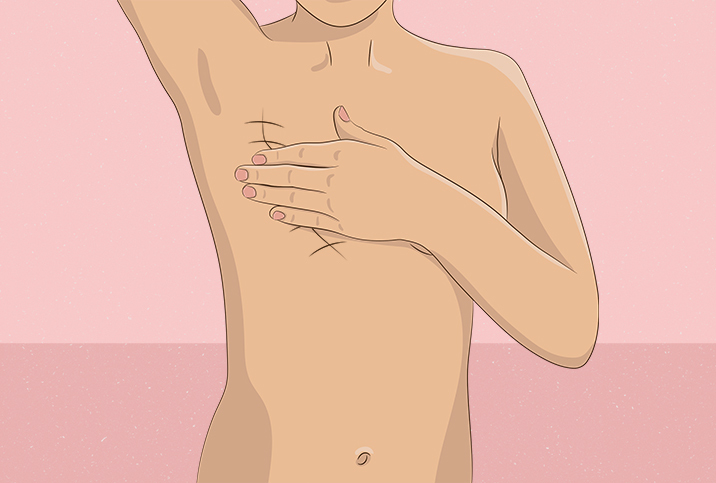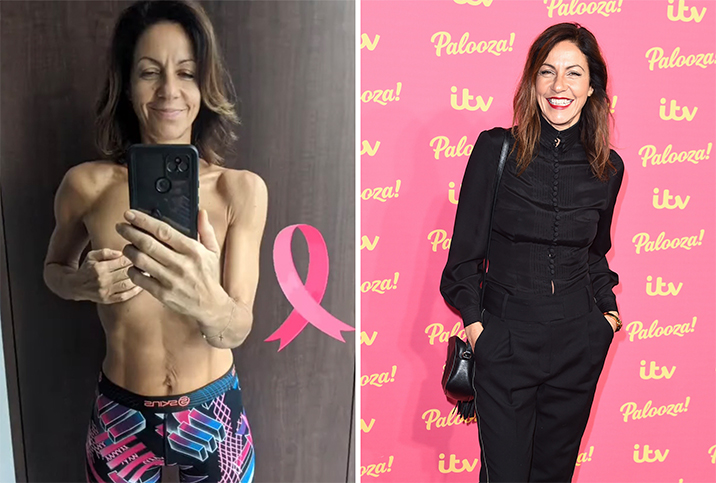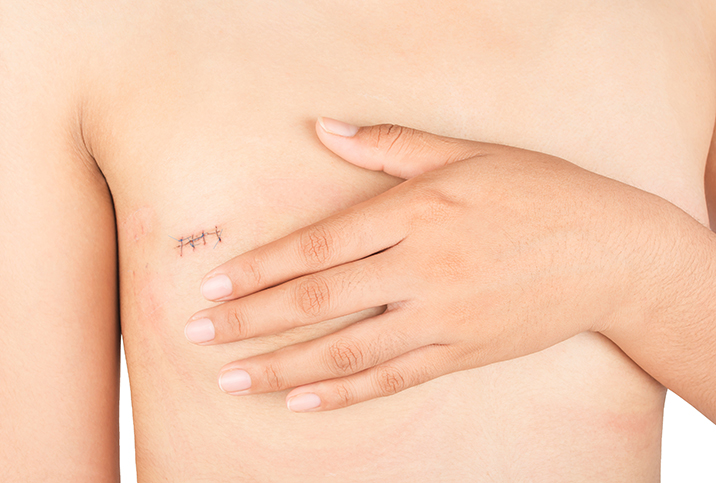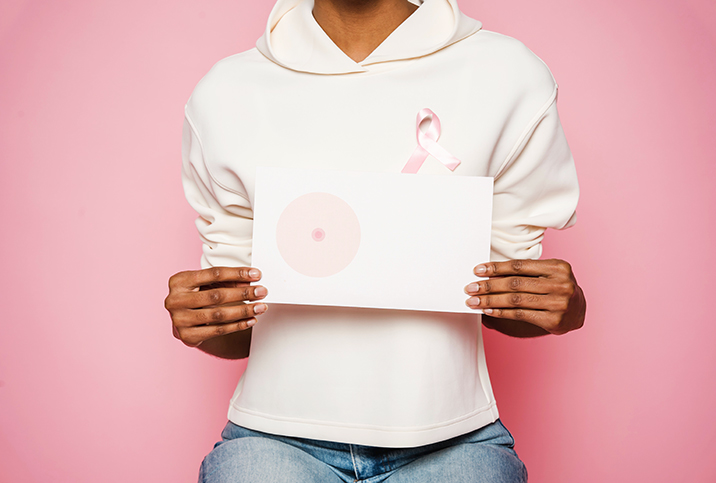Your Post-Mastectomy Guide

One minute you're coming to grips with a breast cancer diagnosis or, in some cases, the high genetic potential of developing breast cancer. The next, you're trying to understand a whole new world of acronyms and terminology. Then you have to try and figure out the different treatment options and surgical options, and what they mean for you. All while managing your everyday responsibilities and commitments. It's a full-time job in itself.
This guide is here to help talk through some things to expect after having mastectomy surgery—both physically and mentally. It is easy to focus on the physical impact of a mastectomy but forget about the emotional impact.
Meg Arroll, Ph.D., M.Sc., a psychologist, scientist and published author, explained that people are likely to face myriad emotions post-mastectomy. Every day may be different in the type and degree of emotion.
"The emotions you experience may seem to come out of nowhere like a tsunami or feel like a constant incoming tide," Arroll said. "Feelings post-mastectomy are often similar to a grieving process.
"Indeed, this loss can trigger shock, fear, anger, disbelief and sadness," she continued. "In addition, many people experience an ongoing sense of underlying worry, even after surgery. However, feelings such as relief may also be experienced, creating a psychological and emotional journey that can feel like a roller coaster."
Bearing all the physical and emotional aspects in mind, we're going to take a look at what the experts say to expect post-mastectomy.
Things to think about before surgery
Janie Grumley, M.D., a breast surgical oncologist and director of the Margie Petersen Breast Center at Providence Saint John's Center and associate professor of Surgery at Saint John's Cancer Institute in Santa Monica, California, explained a mastectomy is not always the answer to breast cancer that people think it is.
"One thing that most women don't realize is that a mastectomy does not usually have any survival benefits. Meaning you don't live longer by doing a bigger operation," Grumley said. She discussed that many people are under the misconception that a bigger operation means a better result, but research shows that is not usually the case.
The type of surgery performed for breast cancer depends on many factors, such as the type, size and stage of cancer. Trends in surgery have changed over the years, swinging from favoring mastectomies to less-invasive procedures. The variety of treatments available is progressing all the time. So, Grumley advises it's essential to realize it's not the size of the surgery that impacts your cancer, but the whole treatment plan.
"For example, oncoplastic breast surgery is a newer type of surgery now available," Grumley said. "This uses plastic surgery lift, incisions and techniques to remove breast cancer while conserving the original breast. It allows us to remove cancer without causing deformity or asymmetry of the breast."
With the constant progression of breast cancer research in mind, it's vital to discuss all your treatment options with your oncology team. Every cancer is different, as is every individual. Therefore, your treatment options will be very personal to you.
If you and your oncologist decide a mastectomy is the best option, then here are a few things to expect in the days and weeks post-surgery.
What do the first few days after surgery look like?
Constance M. Chen, M.D., a board-certified plastic surgeon and breast reconstruction specialist, said the first few days after surgery will look very different depending on which type of surgery you have.
"With any type of surgery, you will be swollen and bruised for the first few days and weeks after surgery," she said. "The swelling and bruising will go down over weeks and months.
"During the first few days and weeks, you will have drains coming out of your breasts, and it is common for the incisions to leak, so that your dressings and clothes may be bloody," Chen continued. "This is all completely normal."
"Most people are not prepared for the number of drains that can be in situ post-surgery. They can be the most uncomfortable and challenging aspect to manage," Grumley added. "Most patients only need to stay one night in a hospital, and then they are taught to manage their drains at home."
Grumley delved into the importance of the oncology nursing team teaching patients how to manage their drains, dressings and wounds at home. This prevents the drains from becoming blocked and enables them to work effectively to assist the healing process.
As a little insight into what you might be able to expect visually in the first few days, depending on the type of surgery you have, Chen discussed a few of the types of surgery in more detail. If you have a:
- Traditional mastectomy with no reconstruction: Your chest will be flat with straight-line scars across where the nipple-areola complex used to be.
- A nipple-sparing mastectomy with no reconstruction: You will look flat, possibly with excess wrinkled skin, and eventually, your breasts may look like they did before puberty.
- A traditional mastectomy with tissue expander/implant reconstruction: You will have a breast mound with a straight line scar across the breast.
- A nipple-sparing mastectomy with tissue expander/implant reconstruction: You will either have a breast mound with the breast skin over it or a lot of excess breast skin over an unexpanded tissue expander.
- A traditional mastectomy with natural tissue breast reconstruction: You will have a breast mound with a skin paddle in the shape of an ellipse.
- A skin-sparing mastectomy with natural tissue reconstruction: You will have a circular skin paddle where the nipple-areola complex used to be.
- A nipple-sparing mastectomy with natural tissue breast reconstruction: You will have a soft breast mound with your breast skin draped over it. If your flap is smaller than your breast skin, then the skin will be droopy and look too big. If your flap is larger than your breast skin, your breasts will look full and lifted. Either way, with natural tissue breast reconstruction, you will probably have a skin paddle where your mastectomy incision is.
"At your first follow-up appointment, your surgeon will check your dressings, and possibly remove them," Chen said. "You may also have some drains removed."
How long is the entire recovery process?
"For women who have a mastectomy, the recovery process takes 4 to 6 weeks. However, it depends on the type of surgery," Grumley said. "It can be 8 to 12 weeks for more complex reconstruction surgeries."
To aid the recovery process, Grumley advises you:
- Avoid heavy lifting and excessive upper limb exercises
- Continue gentle exercise as advised by your oncology team
- Care for your bandages, dressings and drains as shown by your oncology team
- Look out for signs of infection or lymphedema
- Take pain medication as prescribed and recommended by your physician
- Eat a healthy balanced diet
- Rest
- Listen to your body
- Keep your skin clean (showering recommendations vary from surgeon to surgeon)
"I encourage my patients to shower to avoid infection, but I recommend that patients don't soak their wounds in the bath," Grumley explained.
Chen talked about how in the long term, recovery depends on whether or not you have breast reconstruction. And if you have breast reconstruction, what type of breast reconstruction you have.
"If you have no breast reconstruction, you will be flat, your wounds will heal, and the scars will eventually fade," Chen said. "If you change your mind and decide to have breast reconstruction at a later date—months or even years later—that is always a possibility.
"If you have breast reconstruction with tissue expanders, they will need to be exchanged for 'permanent' saline or silicone breast implants," Chen added.
According to breast implant manufacturers, about 50 percent of breast implants require another operation within seven years. Most breast implants will need to be removed or exchanged at some point in the patient's life.
If you have natural tissue breast reconstruction, you may need additional surgeries for symmetry, but the tissue is permanent. "What happens after surgery depends primarily on the type of surgery and the surgeon," Chen said.
Key points to consider before surgery
Grumley noted three points that are useful to think about before having a mastectomy:
- "Please remember that you don't have to have reconstruction. It's a very personal choice," Grumley said. Lots of women opt not to have reconstruction. You can discuss the pros, cons and whether reconstruction is right for you with your oncology team.
- "Don't expect your chest to be completely flat if you decide not to have reconstruction," Grumley advised. Your body shape and type make a big difference in how your chest looks post-surgery. It may look more concave, and you may see more tissue at the sides of your chest. It can be quite a visual shock. So be prepared that it cosmetically can look very different from what you may be expecting if you don't undergo reconstruction.
- "What most women find surprising is the lack of sensation post-surgery," Grumley added. "And, not necessarily sexual sensation, but even when just hugging someone, there is a void of sensation across the middle of your chest."
Please don't forget about your mental health
"The intensity of emotions can feel quite alarming post-mastectomy," Arroll said. "Remember that everyone reacts to major life events in different ways—you may even feel completely numb emotionally, and that's okay, too. There's no right or wrong here."
To help people come to terms with significant shifts in their lives and/or sense of self, Arroll recommends turning to the INSIGHT model of transition resilience. INSIGHT stands for: Increase self-knowledge; Normalize transitions; Support positive coping; Integrate past, present and future; Give time and space; Highlight broader context; Tailor solutions.
So, if we take each in turn, Arroll said, we can find beneficial ways to look after mental health and well-being post-mastectomy:
- Increase self-knowledge by focusing on your strengths—if you're a creative person, explore your feelings through art-making, whereas if you're more of a social person, make sure you connect with others who have also experienced a mastectomy.
- Normalize your experience by accepting that it will take some time to work with your emotions, and there is no rush here.
- Support positive coping by paying attention to the basics in terms of rest and recovery, as well as nutrition and movement within medical advice. Engage in all-important social support, either with your loved ones or specialist support groups.
- Integrate past, present and future by looking at how you've coped with life's difficulties in the past—post-mastectomy can be a particularly tough time, but you will have a wealth of internal resources to call upon.
- Give time and space to heal. In emotional terms, writing down your feelings can be helpful or talking with a professional. Do lean on your specialist nurse and/or counseling during this time.
- Highlight broader context by mindfully looking for all the little things in life that are important—just focusing on these daily can make a substantial difference to the process of recovery.
- Tailor solutions by recognizing your achievements every day, however small, to enhance your confidence. Note these down regularly so you can see your progress, and don't worry if you have some more-challenging days, as recovery often has its ups and downs. A mastectomy can affect confidence, sense of attractiveness, and self-regard (aka self-love). Acknowledging the positive steps you are taking helps rebuild a grounded sense of self.
"But, the most important thing," Arroll concluded, "is to give yourself a hefty dose of self-compassion."


















